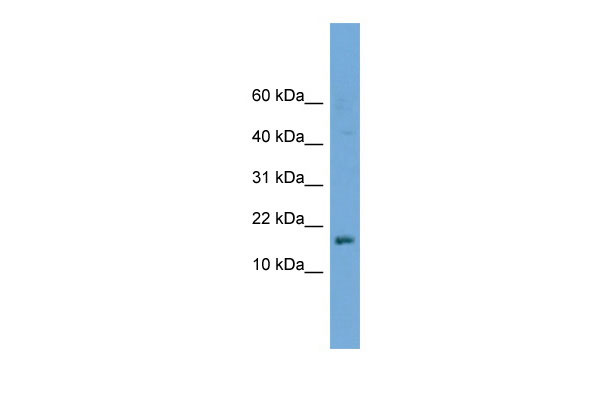C14orf129 antibody - middle region
Rabbit Polyclonal Antibody
- SPECIFICATION
- CITATIONS
- PROTOCOLS
- BACKGROUND

Application
| WB |
|---|---|
| Primary Accession | Q9P0R6 |
| Other Accession | NM_016472, NP_057556 |
| Reactivity | Human, Mouse, Rat, Rabbit, Horse, Bovine, Guinea Pig, Dog |
| Predicted | Rabbit, Pig, Horse, Guinea Pig |
| Host | Rabbit |
| Clonality | Polyclonal |
| Calculated MW | 16kDa |
| Gene ID | 51527 |
|---|---|
| Alias Symbol | GSKIP, HSPC210, MGC4945, C14orf129 |
| Other Names | GSK3-beta interaction protein, GSKIP, GSKIP, C14orf129 |
| Format | Liquid. Purified antibody supplied in 1x PBS buffer with 0.09% (w/v) sodium azide and 2% sucrose. |
| Reconstitution & Storage | Add 50 ul of distilled water. Final anti-C14orf129 antibody concentration is 1 mg/ml in PBS buffer with 2% sucrose. For longer periods of storage, store at 20°C. Avoid repeat freeze-thaw cycles. |
| Precautions | C14orf129 antibody - middle region is for research use only and not for use in diagnostic or therapeutic procedures. |
| Name | GSKIP {ECO:0000303|PubMed:16981698, ECO:0000312|HGNC:HGNC:20343} |
|---|---|
| Function | A-kinase anchoring protein for GSK3B and PKA that regulates or facilitates their kinase activity towards their targets (PubMed:16981698, PubMed:25920809, PubMed:27484798). The ternary complex enhances Wnt-induced signaling by facilitating the GSK3B- and PKA-induced phosphorylation of beta-catenin leading to beta-catenin degradation and stabilization respectively (PubMed:16981698, PubMed:27484798). Upon cAMP activation, the ternary complex contributes to neuroprotection against oxidative stress-induced apoptosis by facilitating the PKA-induced phosphorylation of DML1 and PKA-induced inactivation of GSK3B (PubMed:25920809). During neurite outgrowth promotes neuron proliferation; while increases beta-catenin-induced transcriptional activity through GSK3B kinase activity inhibition, reduces N-cadherin level to promote cell cycle progression (PubMed:19830702). |
| Cellular Location | Cytoplasm. Nucleus |
| Tissue Location | Detected in heart, brain, placenta, liver, skeletal muscle, kidney, testis, lung and pancreas |

Thousands of laboratories across the world have published research that depended on the performance of antibodies from Abcepta to advance their research. Check out links to articles that cite our products in major peer-reviewed journals, organized by research category.
info@abcepta.com, and receive a free "I Love Antibodies" mug.
Provided below are standard protocols that you may find useful for product applications.
References
Zhang Q.-H.,et al.Genome Res. 10:1546-1560(2000).
Ota T.,et al.Nat. Genet. 36:40-45(2004).
Heilig R.,et al.Nature 421:601-607(2003).
Mural R.J.,et al.Submitted (JUL-2005) to the EMBL/GenBank/DDBJ databases.
Chou H.-Y.,et al.Biochemistry 45:11379-11389(2006).
If you have used an Abcepta product and would like to share how it has performed, please click on the "Submit Review" button and provide the requested information. Our staff will examine and post your review and contact you if needed.
If you have any additional inquiries please email technical services at tech@abcepta.com.













 Foundational characteristics of cancer include proliferation, angiogenesis, migration, evasion of apoptosis, and cellular immortality. Find key markers for these cellular processes and antibodies to detect them.
Foundational characteristics of cancer include proliferation, angiogenesis, migration, evasion of apoptosis, and cellular immortality. Find key markers for these cellular processes and antibodies to detect them. The SUMOplot™ Analysis Program predicts and scores sumoylation sites in your protein. SUMOylation is a post-translational modification involved in various cellular processes, such as nuclear-cytosolic transport, transcriptional regulation, apoptosis, protein stability, response to stress, and progression through the cell cycle.
The SUMOplot™ Analysis Program predicts and scores sumoylation sites in your protein. SUMOylation is a post-translational modification involved in various cellular processes, such as nuclear-cytosolic transport, transcriptional regulation, apoptosis, protein stability, response to stress, and progression through the cell cycle. The Autophagy Receptor Motif Plotter predicts and scores autophagy receptor binding sites in your protein. Identifying proteins connected to this pathway is critical to understanding the role of autophagy in physiological as well as pathological processes such as development, differentiation, neurodegenerative diseases, stress, infection, and cancer.
The Autophagy Receptor Motif Plotter predicts and scores autophagy receptor binding sites in your protein. Identifying proteins connected to this pathway is critical to understanding the role of autophagy in physiological as well as pathological processes such as development, differentiation, neurodegenerative diseases, stress, infection, and cancer.


